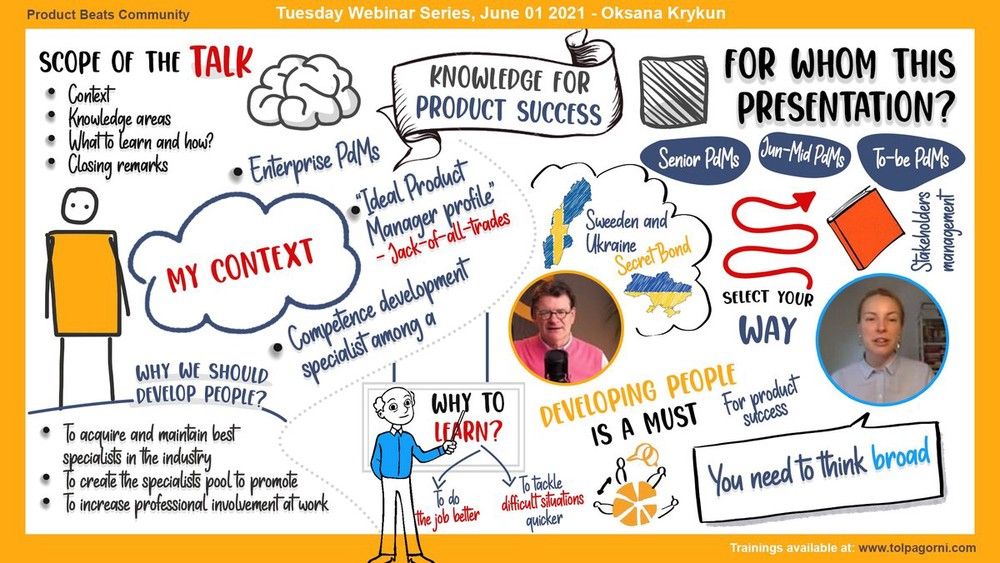Episode 60: Fueling Product Success w/Oksana Krykun
1 June, 2021 / Host: Magnus Billgren
Harnessing Knowledge for Effective Product Management
In the fast-paced world of product management, knowledge plays a crucial role in achieving success. From structuring and fueling teams with knowledge to supporting its effective use, understanding how to harness knowledge is key. In a recent episode of The Productbeats Show, Oksana Krykun, a renowned expert in product management, shared her perspectives on knowledge for product success. This article explores the highlights of her insights and provides actionable takeaways for product managers across different domains and experience levels.
The Importance of Structuring Knowledge
When it comes to product management, structuring knowledge is essential. Oksana emphasized the significance of categorizing knowledge based on three key factors: the type of product manager (tech, strategy, marketing), the maturity level, and the product context. By understanding these dimensions, product managers can effectively provide and fuel their teams with the knowledge required for success.
Knowledge is invaluable only when it is put to use. Oksana stressed that the value lies in the usage of knowledge, and this principle should guide the structuring and fueling of teams with data. By ensuring that knowledge is readily accessible and relevant to the team's objectives, product managers can empower their teams to make informed decisions and drive success.
A Perspective on Knowledge for Success
Oksana's extensive experience in supporting product teams led her to identify three key dimensions that influence the knowledge requirements of product managers: PM type, maturity level, and product context. By considering these factors, product managers can better understand the specific knowledge domains they need to focus on to excel in their roles.
During her talk, Oksana highlighted the significance of providing tailored guidance to different PM roles. She shared insights on developing senior product managers, fostering growth in junior and middle PMs, and addressing the challenges faced by enterprise product managers. Oksana emphasized the importance of aligning knowledge development with the unique demands and responsibilities of each role.
Oksana discussed how her company has created a comprehensive knowledge base for product managers. They developed a job standard based on a specific approach and incorporated the pragmatic marketing framework. By mapping out the different activities and competencies required for success, they were able to provide a structured foundation for knowledge development.
To facilitate effective knowledge acquisition, Oksana emphasized the use of various learning methods. These include online courses, sharing knowledge within the team, and hands-on learning through practical tasks and case studies. Additionally, Oksana highlighted the importance of analytical skills in making informed decisions, suggesting that product managers should consider analytical courses to enhance their capabilities.
Harnessing Knowledge
Oksana stressed that learning should be a continuous process for product managers. The rapidly evolving landscape of product management demands a commitment to ongoing education and staying up to date with industry trends. Product managers must adopt a growth mindset and continually seek opportunities to expand their knowledge base.
For senior product managers and company leaders, investing in the development of their teams is essential. By nurturing the skills and knowledge of their product managers, they can ensure a pool of specialists who are equipped to drive product success. Developing people also increases professional engagement and retention within the organization.
While competency models exist in the market, it's crucial to adapt them to your company's specific context. Oksana highlighted the importance of aligning knowledge development with the unique needs and goals of your organization. This involves understanding the industry landscape, customer base, and company culture to tailor the knowledge and skills required for product success.
Creating a culture of knowledge sharing within your product team can significantly enhance collective learning and success. Oksana emphasized the value of regular knowledge-sharing sessions, where team members can share their experiences, best practices, and lessons learned. Encouraging collaboration and open communication ensures that knowledge flows freely and everyone benefits from each other's expertise.
Product management is a multidisciplinary field that requires a diverse skill set. Oksana encouraged product managers to embrace this multidisciplinary nature and explore various domains beyond their immediate focus. By developing a breadth of knowledge in areas such as design, marketing, engineering, and data analysis, product managers can better understand and collaborate with cross-functional teams, leading to more holistic and successful product outcomes.
Takeaways
- Effective product management relies on harnessing knowledge and leveraging it strategically.
- Structuring product management teams with diverse skill sets and expertise enhances problem-solving and innovation.
- Fostering a culture of continuous learning and professional development is essential for driving product success.
To further enhance your skills and excel in the field of product management, consider enrolling in The Productbeats Product Management Certification Program. This comprehensive program is designed to provide you with the knowledge, tools, and practical experience necessary to thrive in the ever-evolving world of product management. With a curriculum crafted by industry experts and a focus on real-world applications, this certification program will equip you with the expertise to lead successful product initiatives and drive innovation within your organization. Take the next step in your product management journey and join The Productbeats Product Management Certification Program today.
You might also enjoy watching...
Copyright © 2023 ProductBeats AB

Get The Program Brochure
Submit the form below to have The Program Brochure delivered to your inbox
The title of the notification
The descriptive text of the notification


